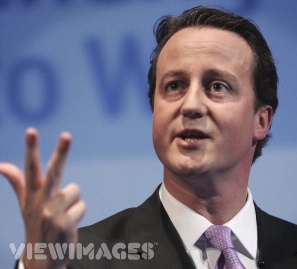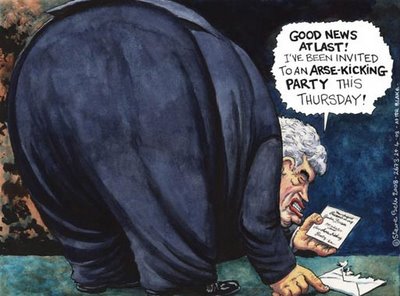Why Ken lost to Boris.
 There's only one thing that's less attractive than gloating, and that's petulance and sulking. While some Tories are gloating, some on the left are throwing their toys out of the pram, and most of all, it comes back to two separate but connected ideas: that Boris is a joke and some of those who voted for him did so directly because of this; and secondly, that Boris will be a disaster. Watching Boris over the weeks leading up to the election proved that he is not a joke, a buffoon, or an idiot, if he ever was. He was not a match for Ken in my eyes, but well over a hundred thousand other individuals thought different. Moreover, those performances persuaded a huge number of voters that he would not be a disaster, and what's more, despite his stewardship of the Spectator through the more rough times, his constituency work shows that although the job of London Mayor is a huge step up, he ought to be a match for it. Pretending that he was otherwise was the first major mistake, and one that a lot are still making.
There's only one thing that's less attractive than gloating, and that's petulance and sulking. While some Tories are gloating, some on the left are throwing their toys out of the pram, and most of all, it comes back to two separate but connected ideas: that Boris is a joke and some of those who voted for him did so directly because of this; and secondly, that Boris will be a disaster. Watching Boris over the weeks leading up to the election proved that he is not a joke, a buffoon, or an idiot, if he ever was. He was not a match for Ken in my eyes, but well over a hundred thousand other individuals thought different. Moreover, those performances persuaded a huge number of voters that he would not be a disaster, and what's more, despite his stewardship of the Spectator through the more rough times, his constituency work shows that although the job of London Mayor is a huge step up, he ought to be a match for it. Pretending that he was otherwise was the first major mistake, and one that a lot are still making.Apart from not taking Boris seriously, why else did Ken lose?
1) The 8 years factor. If 8 years is long enough for the US President, then it's enough for the London Mayor. It would be different if, like in the national election, you were voting for a party rather than an individual, but this was a battle primarily fought on personalities. Ken was always going to suffer from the "change" factor. Ken doesn't deserve any blame for trying for a third term, but it was always going to be a uphill struggle.
2) The assiduous work of Lynton Crosby in targeting the suburbs worked fantastically well, the turnout rising while Ken's constituencies were more apathetic. Ken's people worked extraordinarily hard, but in the end they just couldn't match it.
3) Genuine distaste for Ken. This went far beyond the cliched stereotypical few who hated him from the beginning -- his lack of humility up until he finally was beaten made it ever more difficult to sympathise with him. Calling a Jewish Evening Standard journalist a concentration camp guard and not apologising for it? Urging businessmen who weren't Iranian to take their chances with the Ayatollahs? Not dispatching Lee Jasper until the damage had been done, while alleging that all those who were questioning him were racist? His complete and utter, disgraceful defence of Ian Blair? All of these things hurt, and they added up over time.
4) The festering sore which was the Evening Standard's coverage. If this had been the equivalent of the Sun in 1992, then it wouldn't have made any difference. Instead this was the constant drip-drip-drip of real scandal, hyperbole and smear, going on over a number of months. As Toynbee said in one of her rare moments of clarity, those voting may not actually read the paper, but they do so the billboards all over London, and they get under the skin.
5) Lack of real difference with Boris over policy. Yes, Ken's policies on transport and housing were significantly different, but elsewhere Boris was forced over time as Sunny argues onto Livingstone's territory. This further forced the emphasis onto the personalities, and Johnson in contrast to Ken was fresh and worth a gamble on.
6) The monumental cock-up over the Olympics' cost. Londoners are going to be paying for this millstone around their necks for years to come, and while Livingstone was at least more honest about it than the obscurantist which is Tessa Jowell, he was still partly responsible.
7) Transport. As much as Ken had success on transport, for those without an Oyster card £4.00 for one trip on the Tube is obscene, while bendy buses, although seemingly an arcane issue for those of us outside London, also hurt, even if Johnson's numbers on Routemasters were ludicrous. Then we have those still angry about the congestion charge, not to mention the justified but obviously controversial £25 fee for the most polluting vehicles, then finally the low emissions zone.
8) Connection with Labour at large. Although Livingstone has always been separate from New Labour, he couldn't help but be lumped by some in with Brown and the polls in the local elections showed how this must have hurt him at least slightly.
9) Ken's friends. Sigh. Where to begin on this one? Al-Qaradawi, Jasper, Muslims 4 Ken, all must have put some voters off. The Guardian's article on the day by Zoe fucking Williams also didn't help.
10) Ken himself. At times during the campaign he looked utterly worn out. The allegations about his "drink problem" also must have had some impact.
11) And finally. Not courting second-preference votes persistently enough, or even explaining the system repeatedly and properly so that everyone realised how it works. The alliance with the Greens was a smart move, but the Left List vote collapsed so didn't help as much as it might have done. Not enough was done to court the Liberal Democrat voters' to go for Ken second, although Paddick's performance was poor in any case.
This isn't a time to be despondent. 4 years is a very long time in politics, and by then, with a different, fresh and representative candidate, the left could very well win the position back, especially if Johnson does turn out to be not up to the job. Ken's time had passed, and up against such a strong insurgency, he couldn't match up. This is the message to take, not that Londoners are morons, voting for an idiot and deserve everything they get. Don't despair; it's time to build again.
Labels: Boris Johnson, Ken Livingstone, local elections 2008, London Mayoral election, politics, why Boris won, why Ken lost



